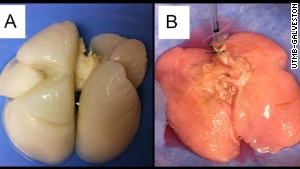The benefit is obvious; organs created from a patient's own adult stem cells mean no chance of rejection and no need for expensive immunosuppressive drugs. Science-fiction/ethical scenarios like raising animals or people for 'harvesting' by wealthy elites are off the table because a customized organ could be grown in the lab.
And it had proof of concept - a trachea had already been created and transplanted into a patient, who had a normal cough reflex shortly thereafter. But there were still obstacles; a trachea is small and linear, the scaffold could basically be a tube, whereas organs like lungs and kidneys are complicated due to size, shape and the complexity of function.
My prediction did not come true, though the lung has been in the works for a while. Instead, the announcement was made last week that a human lung had been grown - basically in a fish tank. So I missed it by two months. The researchers used the lungs of kids who had died in accidents after being organ donors - the lungs were too damaged for transplants but had enough healthy tissue they could strip away everything but a 'skeleton' of collagen and elastin. From there it is was much like what I wrote about with the trachea breakthrough and what I predicted in my Wired article. Obviously there is a size difference. A trachea took 3 days, the lung 5 weeks.

Credit: University of Texas Medical Branch Galveston. Link: CNN.
We can't get too ahead of ourselves. There's no indication the lungs will work right out of the tank, but animal testing will be within a few years and if all goes as planned, human testing could occur 10-12 years in the future. It's 1,600 people on a donor list, not a lot, but a big leap for research because the lung is so large. Just a few years ago the technology to create that many stem cells wasn't available.
CNN.
This unnatural modification is sure to be protested by the demographic that objects to science 'tinkering' with nature, like with food, energy and medical science and rationalizations how 'corporations are being all corporation-y', while religious groups such as Catholics are trumpeting it as a major breakthrough. Yet if you ask most people who accepts science less, religious groups or environmentalists, they would assume religion and be completely wrong.
I couldn't have predicted that either.

"Missed it by that much" - "Get Smart" turned that phrase into a cultural meme before the Internet existed.





Comments